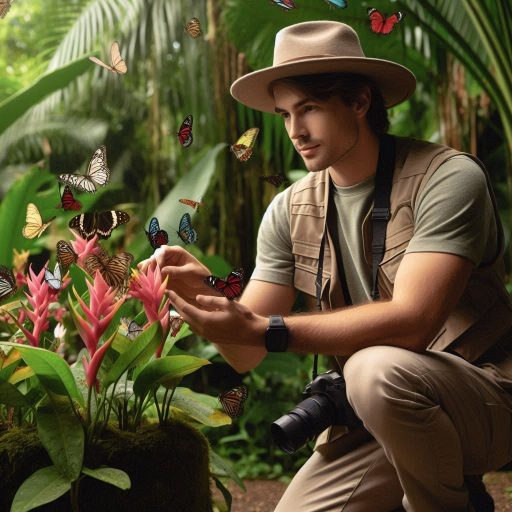Introduction
Zoology is the scientific study of animals and their behavior, physiology, and ecology.
This field encompasses various aspects of animal life, including evolution, conservation, and biodiversity.
Zoologists play a crucial role in understanding wildlife and its ecosystems.
They help conserve species and protect natural habitats.
Zoologists conduct research that informs conservation efforts.
Their studies contribute to knowledge about animal populations, behaviors, and environmental interactions.
This information helps guide policies and practices to preserve endangered species and maintain healthy ecosystems.
The job market for zoologists is diverse and growing.
Opportunities exist in government agencies, research institutions, non-profit organizations, and zoos.
Zoologists can pursue careers in wildlife conservation, marine biology, and environmental education.
As awareness of environmental issues increases, the demand for zoologists rises.
Professionals in this field contribute to critical research and public education.
Zoology offers a variety of career paths, allowing individuals to specialize in their areas of interest.
Aspiring zoologists can find fulfilling careers that make a meaningful impact on wildlife conservation and ecological health.
Education and Training
Required education (Bachelor’s, Master’s, or PhD)
Zoologists require specific education and training to enter the field.
Most zoologists start with a Bachelor‘s degree in zoology or a related field such as biology or ecology.
This foundational degree provides essential knowledge in animal behavior, anatomy, ecology, and physiology.
It prepares students for entry-level positions in research, conservation, and education.
However, many roles in zoology demand advanced degrees.
To specialize and advance in the field, a Master‘s degree or PhD is often necessary.
A Master‘s degree allows zoologists to focus on particular areas of study, such as marine biology, wildlife conservation, or entomology.
Students pursuing a PhD engage in advanced research and contribute new knowledge to the field.
Academic positions, such as university professors or lead researchers, generally require a PhD.
Specializations Within Zoology
Within zoology, there are many specializations.
Marine biologists study ocean ecosystems and marine species, while wildlife biologists focus on terrestrial animals and their habitats.
Zoologists may also specialize in areas such as ecology, evolutionary biology, or conservation biology.
These specializations offer unique research opportunities and job roles, allowing zoologists to tailor their careers to their specific interests.
Each specialization offers distinct challenges and focuses on different aspects of wildlife and ecosystems.
Specialization is key for developing expertise and advancing in the zoology field.
Importance of Hands-On Experience
Gaining hands-on experience is crucial for aspiring zoologists.
Practical experience through internships, fieldwork, or research greatly improves job prospects.
Many universities offer internships with zoos, wildlife organizations, or research institutions.
These opportunities allow students to apply theoretical knowledge and develop critical field skills.
Students may work alongside experienced zoologists, participate in species monitoring projects, or conduct lab research on animal physiology.
Fieldwork exposes students to real-world situations where they study animals in their natural environments.
Research opportunities during university studies also enhance a zoologist‘s resume.
These experiences help students understand the challenges in animal research and prepare them for full-time roles in the workforce.
Employers in both government and private sectors often seek candidates with proven field or lab experience.
Ultimately, pursuing advanced education, choosing a specialization, and gaining hands-on experience prepare zoologists for a successful career.
Aspiring zoologists must build a strong academic foundation, specialize in their areas of interest, and acquire practical skills through internships and research.
These elements combine to provide a well-rounded background for entering the job market and advancing in the field of zoology.
Read: What Does a Geologist Do? Career Overview and Insights
Job Market Trends
Demand for zoologists in various sectors
Zoologists work in various sectors, including government agencies, research institutions, zoos, and wildlife conservation organizations.
Government agencies, such as the U.S. Fish and Wildlife Service, hire zoologists to manage wildlife populations and habitats.
Research institutions employ zoologists to study animal behavior, ecology, and conservation efforts, contributing to scientific knowledge.
Zoos and aquariums also employ zoologists to manage animal care, conservation programs, and public education initiatives.
Wildlife conservation organizations depend on zoologists to protect endangered species and preserve ecosystems.
Zoologists in these organizations develop strategies to mitigate the negative impact of human activity on wildlife.
Growth Potential for Careers in Zoology
The demand for zoologists is expected to grow due to increasing environmental concerns, habitat destruction, and species extinction.
Zoologists play an essential role in addressing these critical issues by conducting research and advocating for wildlife conservation policies.
Their work directly contributes to the development of strategies that can protect ecosystems and maintain biodiversity.
Technological advancements, such as geographic information systems (GIS), drones, and DNA analysis, have created new opportunities for zoologists.
These tools enable zoologists to collect more accurate data on animal populations and their environments.
Zoologists who specialize in fields like conservation biology, climate science, and ecology are in higher demand.
Governments and organizations are investing more resources in environmental sustainability, creating more career opportunities for zoologists.
The growing awareness of climate change and its effects on wildlife further increases the need for skilled professionals in the field.
Zoologists are crucial in shaping public policies that address environmental challenges and protect natural resources.
Salary Range for Entry-Level and Experienced Zoologists
Zoologists’ salaries vary based on education, experience, and the employment sector.
Entry-level zoologists with a Bachelor’s degree typically earn between $40,000 and $50,000 per year.
Those with a Master’s or PhD and specialized skills may earn between $60,000 and $90,000 annually, depending on their role.
Experienced zoologists in senior positions, such as research directors or academic professors, can earn over $100,000 per year.
Location also affects salaries, with zoologists working in urban areas or high-demand states like California and Florida earning more.
Government agencies, large conservation organizations, and research institutions typically offer higher pay and better benefits than smaller organizations.
Though zoologists in smaller nonprofits may earn less, they often gain valuable field experience and hands-on research opportunities.
In general, careers in zoology offer diverse opportunities for growth, advancement, and competitive compensation.
As environmental challenges continue to rise, the job market for zoologists is expected to remain strong.
Zoologists can expect job security, rewarding work, and opportunities to advance their careers, driven by ongoing environmental concerns.
Read: Educational Path: Becoming a Geologist in the USA
Job Responsibilities
Zoologists play a vital role in understanding and protecting animal species and ecosystems.
They conduct research to study animal behavior, habitats, and population dynamics.
This research often focuses on understanding the natural environments of animals and how different factors impact their survival.
Conducting Research on Animal Behavior, Habitats, and Populations
Zoologists observe animals in their natural habitats or controlled environments, collecting data on their behavior, reproductive patterns, and feeding habits.
By understanding these behaviors, zoologists contribute valuable insights to the scientific community.
They analyze their findings to identify trends and changes in animal populations, which can indicate broader environmental shifts.
Developing Conservation Plans to Protect Endangered Species
One of the most critical responsibilities of zoologists is developing conservation plans aimed at protecting endangered species.
Zoologists use their research to determine the most effective strategies for preserving biodiversity.
They work with governments, conservation organizations, and local communities to implement these strategies.
Zoologists create detailed plans that may involve habitat restoration, creating protected areas, or establishing captive breeding programs.
Their work helps prevent species from becoming extinct, ensuring that future generations can benefit from a diverse and balanced ecosystem.
Zoologists also focus on reducing human-wildlife conflicts by promoting sustainable practices that benefit both animals and people.
In addition to developing these plans, zoologists monitor the effectiveness of conservation efforts over time.
They continually assess how well their strategies are working and make adjustments as necessary.
Their ongoing work helps ensure the long-term survival of vulnerable species and ecosystems.
Educating the Public About Wildlife Conservation and Environmental Issues
Zoologists play an important role in educating the public about wildlife conservation and environmental issues.
They work in zoos, aquariums, and wildlife centers, teaching visitors about the importance of protecting animals and their habitats.
Through public outreach programs, zoologists raise awareness about the threats animals face, such as climate change, habitat destruction, and pollution.
In addition to working directly with the public, zoologists often collaborate with schools and educational institutions.
They develop educational materials, lead workshops, and give presentations to inspire the next generation of conservationists.
These efforts help to foster a greater understanding and appreciation for wildlife among the general public.
By educating others, zoologists help build a foundation of support for wildlife conservation efforts.
The more people understand the importance of protecting animals and ecosystems, the more likely they are to take action.
Zoologists also work with policymakers to ensure that their research informs legislation aimed at conserving biodiversity.
Zoologists conduct essential research, develop conservation plans, and educate the public about the importance of wildlife protection.
Their work contributes to preserving biodiversity and ensuring a healthy planet for future generations.
Through their expertise and dedication, zoologists help create lasting positive impacts on wildlife and the environment.
Read: Botany Career Fairs and Networking Events

Career Paths
Zoology offers diverse career paths for those passionate about animals and their ecosystems.
Individuals can explore numerous opportunities, ranging from research positions to management roles.
As zoologists gain experience, they can advance within their careers, taking on new responsibilities and challenges.
Opportunities for Advancement Within Zoology
Zoologists often start in entry-level positions, such as research assistants or field technicians.
As they gain experience, they can progress to roles with more responsibility, such as project managers or lead researchers.
Many organizations value continued education, encouraging zoologists to pursue advanced degrees.
This further education can enhance their qualifications and open doors to leadership positions.
Networking also plays a crucial role in career advancement.
Zoologists can attend conferences and workshops to meet professionals in their field.
Building relationships with other experts can lead to collaboration and job opportunities.
Furthermore, joining professional organizations can provide resources and support for career development.
Potential to Specialize in a Specific Area of Interest
Zoologists have the opportunity to specialize in various fields, such as herpetology, ornithology, or entomology.
Specializing allows zoologists to deepen their knowledge and expertise in a particular area.
This focus can make them more competitive in the job market.
For example, herpetologists study reptiles and amphibians, contributing to our understanding of these species’ biology and conservation needs.
Ornithologists focus on birds, researching their behavior, ecology, and conservation strategies.
By choosing a specialization, zoologists can align their careers with their passions.
Specialization also allows zoologists to work on specific conservation projects or research initiatives.
They can collaborate with organizations dedicated to protecting their area of expertise.
This collaboration can lead to impactful work that addresses critical issues facing specific species or ecosystems.
Transitioning from Fieldwork to Management or Consulting Roles
As zoologists gain experience, they may transition from fieldwork to management or consulting roles.
Many organizations need experienced professionals to oversee projects and teams.
In these management positions, zoologists can leverage their expertise to guide conservation efforts and research initiatives.
Consulting roles also offer opportunities for zoologists to apply their knowledge in various contexts.
Consultants may work with government agencies, non-profits, or private companies.
They provide expert advice on wildlife management, habitat restoration, and conservation strategies.
This transition allows zoologists to impact conservation efforts on a broader scale.
Additionally, zoologists can explore roles in education, outreach, and policy advocacy.
They can influence public understanding of conservation issues and promote sustainable practices.
By moving into these areas, zoologists can broaden their career horizons and contribute to meaningful change.
Zoology offers various career paths with opportunities for advancement, specialization, and transition.
Individuals passionate about animal science can find fulfilling roles that align with their interests and expertise.
By exploring these paths, aspiring zoologists can make a significant impact on wildlife conservation and research.
Read: Preparing for a Botany PhD: Tips and Advice
Skills and Qualities
To succeed in zoology, professionals must possess specific skills and qualities.
These attributes help them conduct research, engage with the public, and contribute to conservation efforts.
Strong observational and analytical skills are crucial in this field.
Transform Your Career Today
Unlock a personalized career strategy that drives real results. Get tailored advice and a roadmap designed just for you.
Start NowStrong Observational and Analytical Skills
Zoologists must observe animals and their behaviors closely.
They study various species in natural and controlled environments.
Observational skills allow them to identify patterns, behaviors, and interactions among species.
Analytical skills enable zoologists to interpret data effectively.
They collect information from field studies, experiments, and surveys.
Analyzing this data helps them draw meaningful conclusions.
Strong analytical abilities also facilitate problem-solving in research and conservation projects.
Zoologists often work with complex datasets and statistical software.
Proficiency in these tools enhances their ability to analyze information accurately.
This analytical foundation is essential for developing effective conservation strategies and understanding species’ needs.
Effective Communication Skills
Zoologists must communicate their findings clearly and effectively.
They present their research to diverse audiences, including scientists, policymakers, and the general public.
Effective communication fosters understanding and support for wildlife conservation initiatives.
Writing skills are equally important for zoologists.
They must produce research papers, reports, and grant proposals.
Clear writing helps convey complex information in an accessible manner.
It also enhances collaboration with other scientists and organizations.
Zoologists often educate others about wildlife conservation.
They engage with schools, community groups, and organizations to raise awareness.
Strong verbal communication skills enable them to inspire and motivate others to take action.
Passion for Wildlife and Conservation Efforts
A genuine passion for wildlife and conservation is essential for zoologists.
This passion drives their commitment to studying and protecting animals and their habitats.
Zoologists often work long hours in challenging conditions, so enthusiasm for their work sustains them.
This passion also influences their approach to research.
Zoologists are motivated to explore new areas of study, discovering innovative conservation methods.
Their dedication can lead to groundbreaking findings that contribute to wildlife preservation.
Zoologists who are passionate about their work often inspire others.
Their enthusiasm can engage the public and encourage more people to support conservation efforts.
This passion is vital for building a community dedicated to protecting wildlife.
Successful zoologists possess strong observational and analytical skills, effective communication abilities, and a passion for wildlife and conservation.
These skills and qualities enable them to conduct impactful research and advocate for the protection of endangered species.
Aspiring zoologists should develop these attributes to thrive in their careers.
By doing so, they can contribute to meaningful advancements in zoology and conservation.
Uncover the Details: Volunteer Opportunities for Optometrists: Giving Back
Networking and Professional Development
Networking and professional development are crucial for zoologists.
They help build connections, gain knowledge, and advance careers.
Engaging with professional organizations enhances opportunities and resources.
Importance of Joining Professional Organizations
Joining professional organizations is vital for zoologists.
Organizations like the American Society of Mammalogists and the Society for Conservation Biology offer valuable resources.
These groups provide access to research, publications, and funding opportunities.
Membership often includes discounts for conferences and workshops.
These events focus on current trends and developments in zoology.
Being part of a professional organization also facilitates networking with other members.
Networking helps zoologists connect with professionals in their field.
Building these connections can lead to job opportunities, collaborations, and mentorships.
Organizations frequently offer forums for members to share experiences and knowledge.
Attending Conferences and Workshops
Attending conferences and workshops is an excellent way to stay updated.
These events allow zoologists to learn from experts and peers.
They can discover the latest research, technologies, and methodologies in zoology.
Conferences often feature presentations, panel discussions, and poster sessions.
These formats provide insights into ongoing research and conservation efforts.
Participants can engage in discussions and ask questions to deepen their understanding.
Workshops often focus on practical skills and hands-on training.
They provide opportunities to learn new techniques and tools relevant to zoology.
By participating in workshops, zoologists can enhance their skill sets and increase their marketability.
Building Connections with Other Professionals
Building connections with other professionals in the field is essential.
Networking allows zoologists to share ideas and resources.
Collaborating with others fosters innovation and promotes effective solutions.
Networking can occur at conferences, workshops, or local events.
Engaging with fellow zoologists helps professionals stay informed about job openings and research opportunities.
Relationships built through networking can also lead to mentorships.
Mentorship is invaluable for career growth.
Experienced zoologists can provide guidance, share insights, and help navigate challenges.
These relationships often result in lasting professional bonds.
Utilizing online platforms enhances networking opportunities.
Social media and professional networks like LinkedIn allow zoologists to connect globally.
They can share research, join discussions, and collaborate with peers worldwide.
Networking and professional development are vital for zoologists.
Joining professional organizations, attending conferences, and building connections enhance career opportunities.
By actively participating in these activities, zoologists can stay updated on industry trends and foster collaborations.
This proactive approach is essential for advancing in the field of zoology and making meaningful contributions to conservation efforts.
Discover More: Key Skills Needed for a Career in Immunology
Conclusion
Zoologists enjoy diverse opportunities in the job market.
They can work in research, conservation, education, or management roles.
Each path offers unique challenges and rewards.
Aspiring zoologists should pursue their passion for wildlife and conservation.
The field is vital for preserving biodiversity and protecting endangered species.
Career opportunities are available in various sectors, including government, academia, and non-profit organizations.
Zoologists can also specialize in areas like marine biology or ethology.
These specializations enhance job prospects and personal fulfillment.
The rewards of a career in zoology are significant.
Professionals contribute to scientific knowledge and environmental sustainability.
They have the chance to make a meaningful impact on wildlife conservation.
Zoologists often engage in fieldwork, research, and public education.
These activities provide hands-on experiences that can be fulfilling.
Furthermore, zoology careers offer opportunities for growth and advancement.
Professionals can develop their skills through networking and professional development.
Ultimately, a career in zoology allows individuals to combine their interests with a commitment to conservation.
Pursuing this path can lead to a rewarding and impactful life dedicated to protecting our planet’s wildlife.
[E-Books for Sale]
The Big Book of 500 High-Paying Jobs in America: Unlock Your Earning Potential
$19.99 • 500 High-Paying Jobs • 330 pages
Explore 500 high-paying jobs in America and learn how to boost your career, earn more, and achieve success!
See All 500 High-Paying Jobs of this E-Book
1001 Professions Without a Degree: High-Paying American Jobs You Can Start Now
$19.99 • 1001 Professions Without a Degree • 174 pages
Discover 1001 high-paying jobs without a degree! Unlock career tips, skills, and success strategies for just $19.99!




